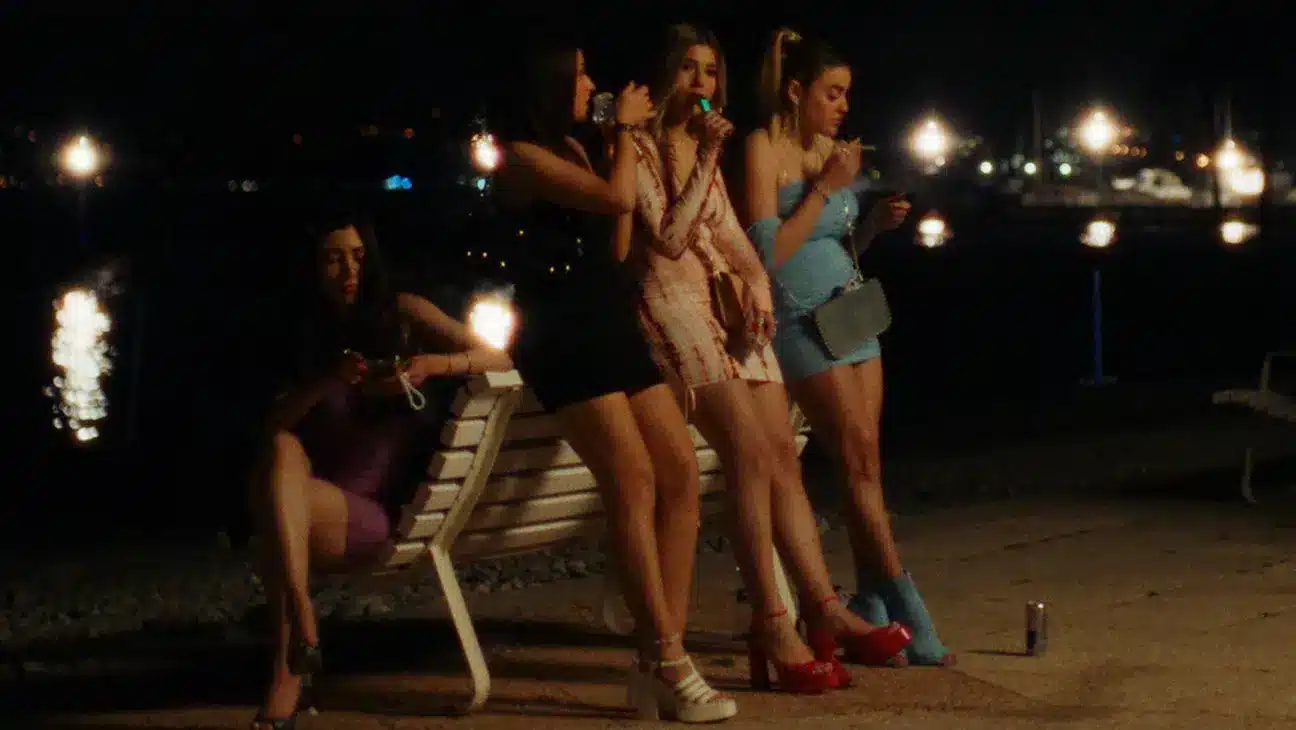
As the only debut in the Cannes Film Festival competition, Agathe Riedinger’s Wild Diamond has a lot to live up to. Fleshing out her 2017 short Waiting for Jupiter, the director examines beauty and fame in a flashy but subdued character study of a young woman’s steadfast pursuit for notoriety. There are certainly noble ideas contained in Wild Diamond, but the film’s hollow script fails to live up to the potential of its premise.
When we first meet Liane, an ambitious 19-year-old stuck in the south of France, she’s in her everyday uniform. She puts on a full face of make-up, complete with lines of contour and concealer, and her blistered feet slip into six-inch platform heels. Reserved when she’s alone, she comes alive in the TikToks she films for her growing audience, which includes the casting director for a Love Island-type show named Miracle Island. Desperate to escape from home, Liane eagerly shows up to the audition, vowing that she can play up her sexiness to the cameras and stand her ground when she needs to.
That promise is reflected in the rambunctious, who we see go clubbing with friends, fight with catcallers and shoplift sequins to decorate her outfits. Riedinger’s film considers femininity as a weapon when women have little else. “The one who is desired has the power,” Liane tells a group of predatory men, though it’s hard to tell if she is certain of that herself or if she’s only wielding her beauty as a false reassurance. Those tensions are all handled by astonishing newcomer Malou Khebizi, who juggles Liane’s contradictions of headstrong confidence and youthful naivety. Much of that interiority plays out on her face, captured in the reflections of mirrors that she’s so occupied by.
Nevertheless, there’s little to grasp onto in terms of Liane’s motivations. Her relationships with her family are relatively shallow. Liane’s younger sister only appears in a few scenes in which their interactions oscillate between earnest love and sisterly bickering. Liane’s mother appears on screen even less so, seemingly only existing as a catalyst for Liane’s desire to get out of town, shown in her mother’s financial instability and revolving series of boyfriends. Fears of abandonment stemming from a childhood spent in foster care are similarly only hinted at but never expanded upon.
Wild Diamond doesn’t have anything particularly new or insightful to say about the social media-fuelled desire for stardom. You’ve heard it before: the internet can be destructive and all-consuming, our online identities don’t reflect reality, fame is corruptive. A young person crumbling in the pursuit of reality TV stardom isn’t such a radical tale when we’ve seen it play out in real life so many times already. But if the film doesn’t contain novel ideas, the presentation is at least alluring. To this day, cinema has struggled to innovate in the depiction of social media platforms, but Riedinger replaces dull interfaces with periodic blocks of text that overwhelm the entire frame to represent the endless comments that Liane is inundated with. There’s no distinction in sentiment, ranging from “the most beautiful girl on Earth” to “kill yourself”, suggesting that to Liane, every comment carries the same weight.
Which is all to say that Riedinger is certainly on track to be a compelling filmmaker. Wild Diamond may be lacking in depth, but there are details in Noé Bach’s cinematography that prove there’s material worth excavating. As a canvas of hyper-feminine beauty, Liane’s body contrasts with the rural milieu of her hometown of Fréjus, as she treks through stretches of motorways and abandoned locales, her glittery heels poking out of tall grass. There’s a beguiling, sparkly facade to the film, but it’s not quite enough to distract from the emptiness underneath.
For more Cannes 2024 coverage, click here.





